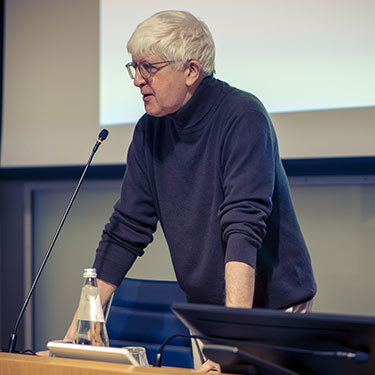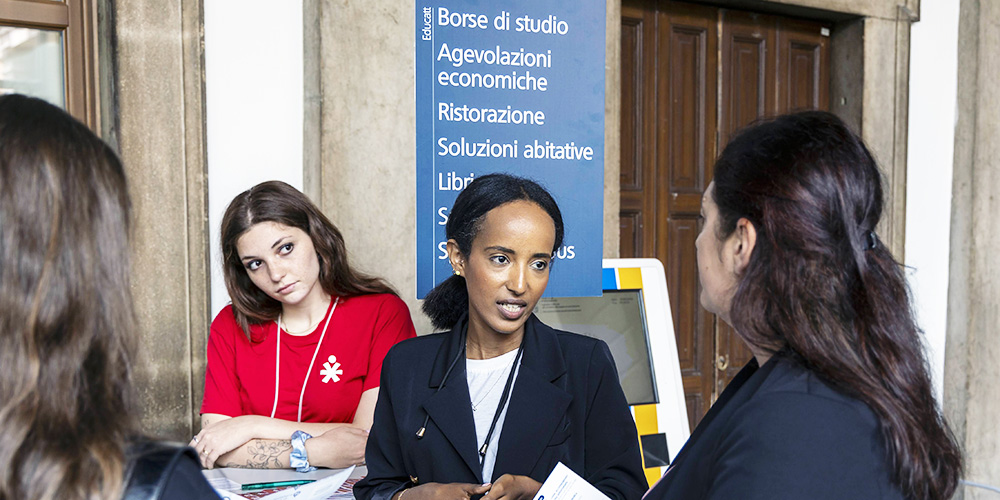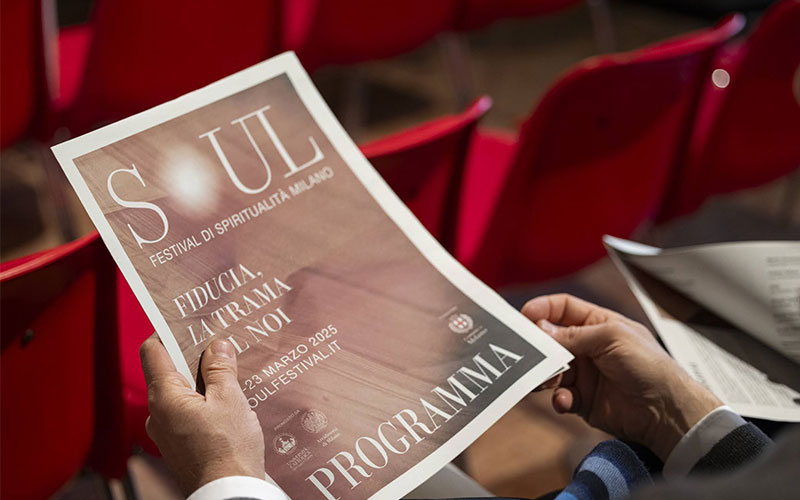.png) Orientamento
Open day Lauree triennali, a ciclo unico e magistrali #Unicatt
Dal 28 marzo al 10 maggio: save the date! Scopri le date nei Campus
Orientamento
Open day Lauree triennali, a ciclo unico e magistrali #Unicatt
Dal 28 marzo al 10 maggio: save the date! Scopri le date nei Campus
Scegli il tuo percorso
In evidenza
Eventi
161 elementi trovati
-
Orientamento lauree triennali OLTRE IL FILM: incontri tra scienza e cinema
Brescia - Dal 21 gennaio 2025 al 09 aprile 2025 -
Open Day Open Day Unicatt
Brescia, Cremona, Milano, Piacenza - Dal 28 marzo 2025 al 12 aprile 2025 -
Seminario Ai margini dell’Ecumene
Brescia - 02 aprile 2025 -
Conferenza Il problema di Plateau
Brescia - Dal 02 aprile 2025 al 04 aprile 2025 -
Ciclo di Seminari Opportunità e buone pratiche per le Aree interne e montane
Piacenza - 02 aprile 2025 -
Stage & Placement CONTROLLO QUALITA’ - ASSICURAZIONE QUALITA’
Piacenza - 02 aprile 2025 -
Ciclo di Seminari Raccontare l’economia
Milano - 02 aprile 2025 -
Ciclo di seminari Innovazione Armonica: una via italiana alle grandi sfide di transizione. L’esperienza di Entopan e dell’Harmonic Innovation Ecosystem
Cremona - 02 aprile 2025 -
Orientamento alle professioni Joblink
Milano - 02 aprile 2025 -
Seminario/Webinar Audit&Feedback (A&F): quali implicazioni per il nostro Sistema sanitario?
Roma - 02 aprile 2025 -
Stage & Placement LINKEDiN LAB | Il Digital Storytelling per comunicare in maniera vincente la propria “storia professionale” sui social media.
Cremona - 02 aprile 2025 -
Tavola rotonda Le espressioni della speranza nelle lingue e nelle letterature
Milano - 02 aprile 2025 -
Lezione aperta Divinity and ethnicity in vergil and ovid: the case of ISIS
Milano - 02 aprile 2025 -
Lezione aperta La vera storia del Requiem di Verdi
Milano - 02 aprile 2025 -
Conferenza Sinkhorn's algorithm convergence in semiconcave settings
Brescia - 02 aprile 2025 -
Lezione aperta Il problema della realtà in sostanza e funzione di Cassirer
Milano - 02 aprile 2025 -
Stage & Placement IT e strumenti di reporting: stato dell'arte e scenari evolutivi
Cremona - 02 aprile 2025 -
Seminario Da locali a globali
Milano - 02 aprile 2025 -
Seminario internazionale permanente Soren Kierkegaard e il pensiero dell’esistenza
Milano - 02 aprile 2025 -
Incontro Quale giustizia per le offese all'ambiente
Milano - 02 aprile 2025 -
Ciclo di Lezioni Il patrimonio culturale e la sua valorizzazione
Milano - 03 aprile 2025 -
Conferenza Ars Docendi
Milano - 03 aprile 2025 -
Il Pianoforte in Ateneo Il Pianoforte in Ateneo
Milano - 03 aprile 2025 -
Stage & Placement How to communicate with emotional intelligence. Let’s train with the LEGO® SERIOUS PLAY® method
Piacenza - 03 aprile 2025 -
Stage & Placement Competenze, cultura aziendale e attitudini personali: il TALENT MANAGEMENT come strumento per la valorizzazione delle risorse umane
Piacenza - 03 aprile 2025 -
Lezione aperta La scrittura del tennis. Giornalismo, letteratura, editoria
Brescia - 03 aprile 2025 -
Seminar The future of communication
Milano - 03 aprile 2025 -
Stage&Placement Simulazioni del colloquio di gruppo – The Adecco Group
Milano - 03 aprile 2025 -
Stage & Placement PRIVATE EQUITY and PORTFOLIO COMPANIES MANAGEMENT (organizational analysis of a change in ownership and management)
Piacenza - 03 aprile 2025 -
Workshop Politiche fiscali per la sostenibilità ambientale e la concorrenza: il CBAM
Piacenza - 03 aprile 2025 -
Incontro Incontri sulla metafisica
Milano - 03 aprile 2025 -
Incontro di studio Kinetic Beauty in Cinema
Milano - 03 aprile 2025 -
Presentazione volume Devi credere nella primavera
Milano - 03 aprile 2025 -
Presentazione volume Caravaggio in prima pagina
Milano - 03 aprile 2025 -
Seminario di studio PLATONE. CURA DI SÉ E DELL’ALTRO
Milano - 03 aprile 2025 -
Lezione aperta Il cantiere delle riforme istituzionali
Milano - 04 aprile 2025 -
Ciclo di seminari a.a. 2024/2025 FORmazione MEtodologica (FORME)
Milano - 04 aprile 2025 -
Stage & Placement LINKEDiN LAB | Create and publish the perfect profile
Piacenza - 04 aprile 2025 -
Ciclo di Seminari La Chiesa “esperta in umanità”
Milano - 04 aprile 2025 -
Ciclo di incontri Il diritto internazionale privato nell’esperienza del giurista pratico
Milano - 04 aprile 2025 -
Convegno inaugurale Novità dallo scavo di San Casciano dei Bagni (SI)
Milano - 04 aprile 2025 -
Seminario La professione docente. Aver cura delle relazioni dentro e fuori la scuola
Brescia - 04 aprile 2025 -
Seminario Exploring new technologies (chat gpt) for foreign languages, linguistics and literature
Milano - 04 aprile 2025 -
Seminario Le nuove frontiere per gli sviluppi sostenibili: AI, innovazione e formazione per la tutela dell’ambiente
Brescia - 04 aprile 2025 -
Seminario Una moda circolare è davvero possibile?
Piacenza - 04 aprile 2025 -
Stage & Placement Lab Inventory Analysis
Piacenza - 04 aprile 2025 -
Lezione aperta EMI and Multimodality
Brescia - 04 aprile 2025 -
Seminario Dialogo sul provvedimento amministrativo a partire da tre recenti monografie
Milano - 04 aprile 2025 -
Convegno Transcaucasica Express
Milano - 04 aprile 2025 -
Formazione continua - Lifelong Learning L’embodied cognition nella riabilitazione: dalle neuroscienze alle pratiche evidence-based
Milano - 05 aprile 2025 -
Testimonianze Il traduttore in-house: tradurre per l’azienda, tradurre in azienda
Brescia - 05 aprile 2025 -
Proiezione film Film and Media Screenings
Milano - 05 aprile 2025 -
Seminario internazionale Conoscenza profetica e libertà umana tra medioevo e rinascimento
Milano - 07 aprile 2025 -
Seminario Pensare la politica
Milano - 07 aprile 2025 -
Evento Shakespeare in musica
Milano - 07 aprile 2025 -
Workshop La multidimensionalità dell’esclusione economica e sociale in Europa: fatti stilizzati e prospettive di policy
Piacenza - 07 aprile 2025 -
Ciclo di Seminari Climate change, diritti umani, sostenibilità ed esg
Milano - 08 aprile 2025 -
Evento Mettiti nei miei panni
Piacenza - 08 aprile 2025 -
Ciclo di lezioni I Giubilei nella storia
Milano - 08 aprile 2025 -
Celebrazione eucaristica In preparazione alla Santa Pasqua
Cremona - 08 aprile 2025 -
Stage & Placement Dinner Meeting con…
Piacenza - 08 aprile 2025 -
Stage & Placement Perché cambiare organizzazione e modello operativo di un'azienda di successo?
Piacenza - 08 aprile 2025 -
STAGE&PLACEMENT Job Target - Lavoropiù Spa
Milano - 08 aprile 2025 -
Incontro Magnifico, ricco e mirabile. Letture dell’«Orlando furioso»
Brescia - 08 aprile 2025 -
Lezione aperta Enseigner la littérature en classe de FLE. Le texte poétique.
Brescia - 08 aprile 2025 -
Celebrazione eucaristica Celebrazione eucaristica in preparazione alla Santa Pasqua
Milano - 08 aprile 2025 -
Presentazione volume Speranza. Passione del possibile
Milano - 08 aprile 2025 -
Incontri Pomeriggi manzoniani
Milano - 09 aprile 2025 -
Lezione aperta 5.000 anni di pratiche giubilari: note storico-religiose
Brescia - 09 aprile 2025 -
Ciclo di Seminari Appennino Hack
Piacenza - 09 aprile 2025 -
Stage & Placement Students give a presentation in pairs or alone. Discussion and Feedback
Piacenza - 09 aprile 2025 -
Stage & Placement PERSONAL BRANDING LAB | Marketing relazionale per presentazione di sé in chiave storytelling, job application e cover letter
Piacenza - 09 aprile 2025 -
Stage & Placement INTERVIEW LAB | Preparati seguendo le principali linee guida e simula un colloquio individuale con il recruiter
Cremona - 09 aprile 2025 -
Stage&Placement Recruiting Day Audit&Assurance with Deloitte
Milano - 09 aprile 2025 -
Convegno Trapianto di rene da donatore vivente
Roma - 09 aprile 2025 -
Presentazione volume L'invalidità parziale del provvedimento amministrativo
Milano - 09 aprile 2025 -
Lezione aperta L'interprete in scena: comunicazione, gesto, metamorfosi
Milano - 09 aprile 2025 -
Series of lectures International arbitration through the eyes of practitioners
Milan - 10 April 2025 -
Ciclo di Seminari La Traduzione Letteraria
Milano - 10 aprile 2025 -
Laboratorio didattico Insegnare la letteratura tedesca nella scuola secondaria superiore
Milano - 10 aprile 2025 -
Seminar The future of communication
Milano - 10 aprile 2025 -
Lectio L’utilizzo dell’intelligenza artificiale nello Stato della Città del Vaticano
Piacenza - 10 aprile 2025 -
Stage & Placement The customer advocacy approach in Arval Italy organization
Piacenza - 10 aprile 2025 -
STAGE&PLACEMENT Cv Point – Gi Group
Milano - 10 aprile 2025 -
Stage&Placement Career Insights - Scopri le professioni
Milano - 10 aprile 2025 -
Stage&Placement - Facoltà di Scienze Linguistiche e Letterature Straniere Meet Esselunga
Milano - 10 aprile 2025 -
Incontro Nuovi rapporti tra welfare aziendale e welfare sociale
Brescia - 10 aprile 2025 -
Workshop Fisco, sostenibilità e intelligenza artificiale: il punto di vista del tax director di una multinazionale
Piacenza - 10 aprile 2025 -
Lezione aperta Gli istituti dell’amministrazione condivisa quale strumento di politica sociale nella città
Brescia - 11 aprile 2025 -
Giornata di studi Giornata Aldo Menichetti
Milano - 11 aprile 2025 -
Ciclo di Seminari La Chiesa “esperta in umanità”
Milano - 11 aprile 2025 -
Seminario L’adozione dei libri di testo. Quali implicazioni professionali ed etiche?
Brescia - 11 aprile 2025 -
Convegno Non così rari. Approccio alla diagnosi e trattamento dei tumori rari
Roma - Dal 11 aprile 2025 al 12 aprile 2025 -
Seminario La Cina degli anni Novanta attraverso i romanzi di Lu Min e Lu Nei
Brescia - 11 aprile 2025 -
Lezione XXI Lezione Mario Arcelli
Piacenza - 11 aprile 2025 -
Convegno Per una storia delle scienze politiche in Italia
Milano - Dal 13 aprile 2025 al 14 aprile 2025 -
Talks La storia di Gianluca GALLI, Founder e former owner di @QUAM
Piacenza - 14 aprile 2025 -
STAGE&PLACEMENT CV Game & Lab
Milano - 14 aprile 2025 -
Stage & Placement Scopri il tuo futuro con Adecco LifeScience
Roma - 14 aprile 2025 -
Evento formativo Nova et vetera nel diritto delle successioni
Cremona - 14 aprile 2025 -
Incontro Semi di speranza nell’avventura della scienza
Brescia - 15 aprile 2025 -
Incontro Semi di speranza nell’avventura della scienza
Brescia - 15 aprile 2025 -
Convegno Le novità della riforma tributaria in materia di operazioni
Piacenza - 15 aprile 2025 -
Stage & Placement La Rete di Imprese come strumento per l’export del food made in Italy
Piacenza - 15 aprile 2025 -
Seminario Journée ESABAC Brescia-Bergame
Brescia - 15 aprile 2025 -
Seminario La via della carità. Storia ed evoluzione della Caritas diocesana di Piacenza-Bobbio
Piacenza - 15 aprile 2025 -
Stage & Placement Training Public Speaking Skills for personal and academic success
Piacenza - 16 aprile 2025 -
Ciclo di Seminari Raccontare l’economia
Milano - 16 aprile 2025 -
Seminar The European Union and international law in times of Trump II
Milano - 16 aprile 2025 -
Orientamento alle professioni Joblink
Milano - 16 aprile 2025 -
Ciclo di Seminari La Chiesa “esperta in umanità”
Milano - 28 aprile 2025 -
Ciclo di lezioni I Giubilei nella storia
Milano - 29 aprile 2025 -
Workshop interdisciplinare Signore degli eserciti
Milano - 29 aprile 2025 -
Conferenza Matematica Pop
Brescia - 29 aprile 2025 -
Stage & Placement Start-up e Sostenibilità per il Futuro: come innovano le aziende di grandi dimensioni? Un viaggio nel mondo KME
Piacenza - 29 aprile 2025 -
Incontro Magnifico, ricco e mirabile. Letture dell’«Orlando furioso»
Brescia - 29 aprile 2025 -
Lezione aperta L’anno del Grande ritorno e del Grande perdono. Il Giubileo del 1950
Brescia - 30 aprile 2025 -
Stage & Placement CV LAB | Imposta il format più adeguato al tuo contesto professionale
Cremona - 30 aprile 2025 -
Ciclo di Seminari La Chiesa “esperta in umanità”
Milano - 02 maggio 2025 -
Talks La storia di Guido RAVENNA, CEO Montebello Advisory
Piacenza - 05 maggio 2025 -
Scientific Colloquium The Hope for a Nourished Planet: which agenda for Catholic Universities?
Cremona - Dal 05 maggio 2025 al 06 maggio 2025 -
Ciclo di lezioni I Giubilei nella storia
Milano - 05 maggio 2025 -
PhD Course Non linear dynamics in economics and physics
Brescia - Dal 05 maggio 2025 al 08 maggio 2025 -
Lezione aperta Anno 1300: il Giubileo di Bonifacio VIII e gli artisti
Brescia - 06 maggio 2025 -
Lezione aperta Il Giubileo del 2000
Brescia - 06 maggio 2025 -
Evento Mettiti nei miei panni
Milano - Dal 06 maggio 2025 al 07 maggio 2025 -
Ciclo di lezioni I Giubilei nella storia
Milano - 06 maggio 2025 -
Proiezione film Film and Media Screenings
Milano - 06 maggio 2025 -
Stage & Placement BOBST, oltre 130 anni di tradizione e innovazione: soluzioni per un packaging sostenibile
Piacenza - 06 maggio 2025 -
Lezione aperta L'uso dei documenti epigrafici nella Periegesi di Pausania
Brescia - 06 maggio 2025 -
Seminario Costruire la salvezza
Brescia - 07 maggio 2025 -
Workshop interdisciplinare Signore degli eserciti
Milano - 07 maggio 2025 -
Stage & Placement IL COLLOQUIO DI GRUPPO ricreato attraverso la metodologia dell’ASSESSMENT CENTER.
Cremona - 07 maggio 2025 -
Lezione aperta I rapporti pubblico-privati nel sistema di accoglienza dei migranti umanitari
Brescia - 08 maggio 2025 -
Il Pianoforte in Ateneo Il Pianoforte in Ateneo
Milano - 08 maggio 2025 -
Stage & Placement Students give a presentation in pairs or alone. Discussion and Feedback
Piacenza - 08 maggio 2025 -
Ciclo di Seminari La Traduzione Letteraria
Milano - 08 maggio 2025 -
Stage & Placement RICERCA & SVILUPPO
Piacenza - 08 maggio 2025 -
Stage & Placement THE GROUP INTERVIEW recreated through the ASSESSMENT CENTER methodology. Case study with focus on analysis and resolution of a work situation.
Piacenza - 09 maggio 2025 -
Lezione aperta Lavorare scrivendo
Milano - 09 maggio 2025 -
Lezione aperta Retorica, poetica e critica letteraria nell’Italia del Seicento
Brescia - 09 maggio 2025 -
Seminario Exploring new technologies (chat gpt) for foreign languages, linguistics and literature
Milano - 09 maggio 2025 -
Ciclo di Seminari La Chiesa “esperta in umanità”
Milano - 12 maggio 2025 -
PhD Course Statistical Methods for Physical and Biomedical Sciences
Brescia - Dal 12 maggio 2025 al 27 maggio 2025 -
Evento Mettiti nei miei panni
Brescia - 13 maggio 2025 -
Workshop interdisciplinare Signore degli eserciti
Milano - 14 maggio 2025 -
Incontro con l'autore Daniele Mencarelli
Milano - 14 maggio 2025 -
Orientamento Incontro di preparazione al TIEC: Test di Ingresso a Economia in Cattolica
Online, su Webex - 14 maggio 2025 -
Evento Workshop Prova l'orchestra e Concerto degli studenti
Milano - 15 maggio 2025 -
Ciclo di seminari a.a. 2024/2025 FORmazione MEtodologica (FORME)
Milano - 16 maggio 2025 -
Seminario internazionale Conoscenza profetica e libertà umana tra medioevo e rinascimento
Milano - 23 maggio 2025 -
Lezione aperta Tè, amianto, pietre serpentine: Athanasius Kircher e le meraviglie della Cina accessibile
Milano - 28 maggio 2025 -
Convegno FIT FOR 55: il ruolo della tassazione energetica nella strategia europea per ridurre le emissioni di gas serra
Cremona - 29 maggio 2025 -
Seminario Il diritto di contare
Brescia - 04 giugno 2025 -
Il Pianoforte in Ateneo Il Pianoforte in Ateneo
Milano - 05 giugno 2025 -
Ciclo di seminari a.a. 2024/2025 FORmazione MEtodologica (FORME)
Milano - 12 giugno 2025 -
Ciclo di seminari a.a. 2024/2025 FORmazione MEtodologica (FORME)
Milano - 19 settembre 2025 -
Il Pianoforte in Ateneo Il Pianoforte in Ateneo
Milano - 25 settembre 2025 -
Ciclo di seminari a.a. 2024/2025 FORmazione MEtodologica (FORME)
Milano - 09 ottobre 2025 -
Il Pianoforte in Ateneo Il Pianoforte in Ateneo
Milano - 16 ottobre 2025 -
Il Pianoforte in Ateneo Il Pianoforte in Ateneo
Milano - 13 novembre 2025
Succede in ateneo

Brescia
Online il portale "Lo scriba del tennis. Libri e carte di Gianni Clerici" Dalla rete dei campi da tennis a quella di internet. Articoli, foto e gli appunti appartenuti al grande giornalista scomparso nel 2022 ora consultabili sul portale dedicato
Cremona
Severgnini per Peses: «Ragazzi, il futuro dell'Italia lo fate voi» Un viaggio tra paure, sogni e opportunità. Beppe Severgnini a Cremona ha incontrato nel campus di Santa Monica gli studenti del liceo Anguissola nell'ambito del Programma di Educazione per le Scienze Economiche e SocialiMilano
Educazione finanziaria, il sapere che conta È uno dei messaggi proposti a studentesse e studenti dall’economista di Stanford Annamaria Lusardi, da anni impegnata a sensibilizzare sul tema le nuove generazioni: bisogna farsi un minimo di competenze per gestire le proprie finanze e vivere sereniRoma
Sapere, saper fare, saper essere: con il camice bianco verso il futuro Nel campus di Roma dell’Università Cattolica il rito solenne della vestizione per le studentesse e gli studenti del terzo anno del corso di laurea in Medicina e chirurgia, nel passaggio al triennio clinico e alle attività in corsiaMilano
Gestione dei soldi, per le donne un gap da colmare La felicità passa anche da qui, per questo bisogna prendere in mano il proprio futuro economico. Vanno potenziati i percorsi di educazione finanziaria e di empowerment femminile nei contesti finanziariMilano
Dal palco dell’Ariston alla Cattolica: Alex Wyse si racconta agli studenti Il giovane cantante, secondo classificato all’ultimo Festival di Sanremo nella categoria Nuove Proposte, ospite del master in Comunicazione musicale
intelligenza artificiale
La bolla diabolica dell’algoritmo: c’è ancora spazio per il noi? Miguel Benasayag, Mark Hunyadi
demografia, lavoro
Italia 2050 Che paese sarà l’Italia nel 2050? È possibile oggi capire che strada prendere per governare i cambiamenti in atto? Per governare l'incertezza del futuro bisogna evitare di semplificare problemi complessi. Dobbiamo pensare a lungo termine, considerare tutte le variabili in gioco e creare una rete globale di conoscenza. A cura di Marzio Mian e Nicola Scevola 5 episodi
inclusione
Tutti inclusi Un viaggio tra le voci dell’Università per esplorare gli effetti dell’intelligenza artificiale nella nostra vita. Perchè i robot sono già qui con noi. O forse contro di noi. Alleati dell’uomo o nemici dell’umanità? Massima espressione di intelligenza oppure d’incoscienza? 5 episodi
migranti
Sconfinati L’onda dei profughi in fuga dalla guerra in Ucraina sconvolge l’Europa e impone di aggiornare il dibattito sugli esodi e l’accoglienza, fenomeni che da decenni dividono le coscienze e la politica del Vecchio Continente. Le voci-guida sono quelle degli esperti dell'Ateneo, integrate da testimonianze nazionali e internazionali di primo piano. Una serie podcast in cinque puntate dell'Università Cattolica a cura Marzio Mian e Nicola Scevola, pubblicata su Avvenire 5 episodi
migranti, politica estera
2025, andata o ritorno Una serie di Avvenire realizzata in collaborazione con l’Università Cattolica, che trae spunto dai grandi temi emersi alla Settimana sociale dei Cattolici italiani di Trieste. Cinque puntate per cinque dimensioni chiave di un anno, il prossimo, che si preannuncia come un sottile e delicato crinale. 5 episodi
media
Io sono la radio Una serie a cura degli studenti del Master Fare Radio dell'Università Cattolica del Sacro Cuore 5 episodi
letteratura, pedagogia
Ritratti di un tempo Ci sono personaggi che segnano un’epoca. Alcuni di fama indiscussa sono diventati miti o “leggende”, altri meno noti alle grandi platee sono riconosciuti perché hanno contribuito a una scoperta scientifica, hanno vinto un Premio Nobel, o hanno avuto una vita spiritualmente esemplare, o sono diventati un’icona del loro tempo in campo letterario, artistico, musicale. Attraverso queste donne e questi uomini, prende forma di volta in volta un periodo storico, una generazione, una cultura. Affidiamo questi ritratti ai docenti dell’Università Cattolica del Sacro Cuore per ascoltare racconti, aneddoti, interpretazioni e lasciarsi trasportare da provocazioni e suggestioni. 11 episodi
sociologia
Padri e Madri della Sociologia Racconti, aneddoti e storie di chi ha formato le idee sulla società. Li raccontano in questa serie podcast le autrici e gli autori che hanno contribuito alla stesura del manuale di Sociologia generale (Vita e Pensiero, 2022) curato da Rita Bichi 7 episodi






















